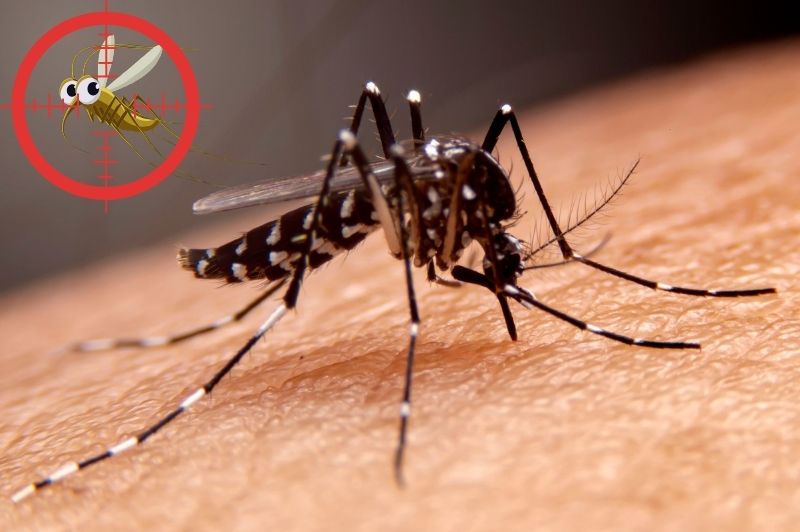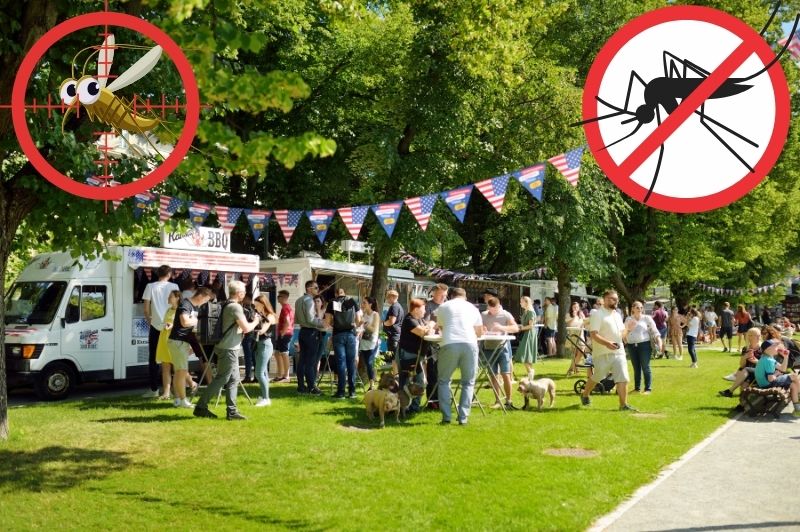Summer is a season where happiness and pain coexist because, in addition to watermelon, air conditioning, and ice cream that make people happy, there are also annoying mosquitoes! Especially for mothers, mosquito prevention is even more troublesome. Mosquito coils/liquids containing DEET cannot be used; even toilet water has to be diluted 4-5 times because of its strong irritation.
In fact, mosquito repellent is not annoying indoors, but outdoors. Take your children for a walk in the community after dinner, and they will become fat meat in the mouths of mosquitoes in a few minutes.
A Mother’s Encounter with Mosquito Bites
A few days ago, I was walking around the neighborhood with my baby and met a mother pushing a baby stroller. After a brief chat, I was attracted by the baby in the stroller. The baby was only a few months old, with fair and tender skin, but the only flaw was that there were red spots on the forehead and neck, and on the face. Those red spots were not only red but also swollen, and looked like they had been bitten by some poisonous insects.
I asked the mother, and she said it was a mosquito bite. I couldn’t believe it. The mother also said that her baby was allergic, and every time he was bitten by a mosquito, the part would be red and swollen, and there was really nothing she could do.

Common Misconceptions About Mosquito Bites
A neighbor heard our conversation and came over to ask about the child. But when he saw the mosquito bite on the baby’s face, he laughed.
The old man stretched out his arm and told the mother that smart children are more likely to be bitten by mosquitoes, and that children’s blood is sweet, which even mosquitoes like. Unlike us older people, mosquitoes avoid us when they see us.
After listening to the old woman’s humor, I was impressed because I knew the reason why babies are more likely to be bitten was not as she said.
Why Do Mosquitoes Prefer Babies?
90% of parents will find that if there are many children in one room, some babies will become targets of mosquito attacks, while other babies are almost not attacked by mosquitoes, their bodies are clean, and there is no mosquito bite.
In fact, mosquitoes are selective when biting babies. For example, babies with the following characteristics are more likely to be favored by mosquitoes.
Sweaty Babies and Mosquitoes
Mosquitoes are very interested in acids and ammonia in the human body. The amino acids and lactic acid in human blood together form a complex amino acid mixture.
Once this substance combines with ammonia in sweat, it produces trimethylamine, the smell of which is particularly attractive to mosquitoes.
Higher Body Temperature and Mosquito Attraction
Children’s body temperature is higher than that of adults. When mosquitoes are looking for targets, they will find their targets by temperature, so children are more likely to be bitten by mosquitoes.
Preventing Mosquito Bites in Babies
- Places with lush flowers and plants, dirty and humid environments are where mosquitoes breed and gather. Try not to take your baby to play in these places. When doing outdoor activities, use some mosquito repellent specially made for babies.
- Hang a mosquito net with good breathability on the baby’s crib or stroller.
- Clean your home regularly to prevent mosquitoes from hiding and breeding.
- Baby’s bedding, clothes, strollers, bed boards, and other items should be often dried in the sun. The cool mat should also be scrubbed every day.
How to Treat Mosquito Bites
No matter how many precautions you take, mosquitoes are the hardest to prevent.
Even if parents fully arm their children, there are bound to be times when they are careless, giving mosquitoes an opportunity to take advantage.
First Aid for Mosquito Bites
If your child is bitten by a mosquito, you can do the following:
- Apply alkaline soap and water to the red and swollen area and wash it off after a few minutes.
- If you have aloe vera at home, you can break it apart and apply it locally, which has a good anti-itching effect.
- Apply compound calamine lotion externally. Skin papules and erythema will usually disappear after 3 to 5 days.
- If it develops into insect bite dermatitis and local redness, swelling, nodules, and blisters appear, you can apply Elocon.
The Hidden Dangers of Mosquitoes
According to statistics from the World Health Organization, mosquito bites cause more than 1 million deaths each year! How could such a tiny bug kill so many people?
In fact, it is not the mosquitoes that kill people, but the parasites they carry – Plasmodium. Mosquito bites can transmit this Plasmodium to the bodies of healthy people, thus causing the disease malaria.
Diseases Spread by Mosquitoes
The survey found that there are more than 80 kinds of diseases transmitted by mosquitoes to date. The most well-known ones are malaria, Japanese encephalitis, filariasis, dengue fever, and yellow fever. It can cause encephalitis, hemorrhagic fever, hepatitis, fever, mild discomfort, arthritis, etc.
Types of Mosquito Vectors and the Diseases They Spread
Common mosquito vectors include Anopheles, Culex, and Aedes. Different types of mosquitoes can spread different diseases.
- Malaria: Transmitted by Anopheles mosquitoes, with the main source of infection being malaria patients. In my country, it is more common in areas south of the Huaihe River. Clinical characteristics include intermittent chills, high fever, and profuse sweating.
- Filariasis: Transmitted by Culex mosquitoes, with early symptoms including fever, acute lymphadenitis, and lymphangitis, and later symptoms including elephantiasis and lymphedema.
- Dengue Fever: Mainly transmitted by Aedes mosquitoes, with main symptoms including fever, headache, muscle and joint pain, bleeding from the gums, nasal cavity, or digestive tract, rash, and swollen lymph nodes.

Mosquito Prevention Is a Daily Task
Most people are deceived by the “tiny” existence of mosquitoes, and thus ignore the terrible harm that mosquito bites may cause, causing great harm!
Summer is the most active time for mosquitoes. During this time, mosquitoes are particularly energetic, and many children who have no ability to resist are harmed.
Therefore, to protect the health of your family and children, we must persist in preventing and repelling mosquitoes every day.
Introduction to Mosquito Protection
Therefore, in order to protect the health of your family and children, we must persist in preventing and repelling mosquitoes every day.
Common Mosquito Repellent Products
90% of people don’t know that mosquitoes are most afraid of mosquito coils. Here’s a way to make mosquitoes disappear in 5 minutes. To drive away and eliminate mosquitoes, I have used a variety of products:
- Mosquito coils
- Insecticide spray
- Electric mosquito liquid
The result is either useless, or you kill one wave and another wave comes.
Risks of Chemical Repellents
What’s worse is that mosquito-repellent coils and insecticides contain toxic substances such as:
- Transfluthrin
- DEET
Chemical reactions occur after combustion and volatilization, and excessive inhalation will harm your health. Mosquito-repellent coils are included in the scope of pesticide management, and PM2.5 concentration generated by burning mosquito coils is even more than twice that of cigarettes!
Conclusion
Protecting your family from mosquitoes is a crucial daily task, especially during the summer when mosquitoes are most active. By understanding why mosquitoes are attracted to certain individuals and taking preventive measures such as using baby-safe repellents and maintaining a clean environment, parents can significantly reduce the risk of mosquito bites. It’s essential to be vigilant and take proactive steps to safeguard the health and well-being of your family, as mosquito bites can lead to serious health complications.


